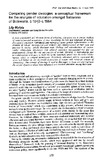| dc.contributor.author | Mafela, L. | |
| dc.date.accessioned | 2010-06-21T11:03:22Z | |
| dc.date.available | 2010-06-21T11:03:22Z | |
| dc.date.issued | 1997 | |
| dc.identifier.citation | Mafela, L. (1997) Competing gender ideologies: a conceptual framework for the analysis of education amongst Batswana of Botswana, c.1840-c.1994, Pula: Botswana Journal of African Studies, Vol. 11, No. 2, pp. 156-166 | en_US |
| dc.identifier.issn | 0256-2316 | |
| dc.identifier.uri | http://hdl.handle.net/10311/525 | |
| dc.description.abstract | In both precolonial and Westerm forms of schooling, education was a crucial medium of construction and articulation of ideas concerning the role and behaviour of women. Precolonial education reproduced and maintained sharp gender differentiation in the division of labour. Socialisation and women's own internalisation of their role and position in society, upheld dominant male ideology and subordination of women. Under colonialism, missionary and colonial education renegotiated but did not fundamentally change the role and position of women. However, it inadvertently also provided women with ways to move out of the household sphere into the wider labour market, albeit as unequal participants. Missionary education strictly separated the sexes and rested on the continued association of women with Victorian notions of 'domesticity'. The concept of ideology is used in this paper to tease out and highlight the gender dynamics which have influenced and directed education among Batswana. | en_US |
| dc.language.iso | en | en_US |
| dc.publisher | Research and Development Unit, University of Botswana. http://www.thuto.org | en_US |
| dc.subject | Gender | en_US |
| dc.subject | Education | en_US |
| dc.subject | Botswana | en_US |
| dc.title | Competing gender ideologies: a conceptual framework for the analysis of education amongst Batswana of Botswana, c.1840-c.1994 | en_US |
| dc.type | Published Article | en_US |

